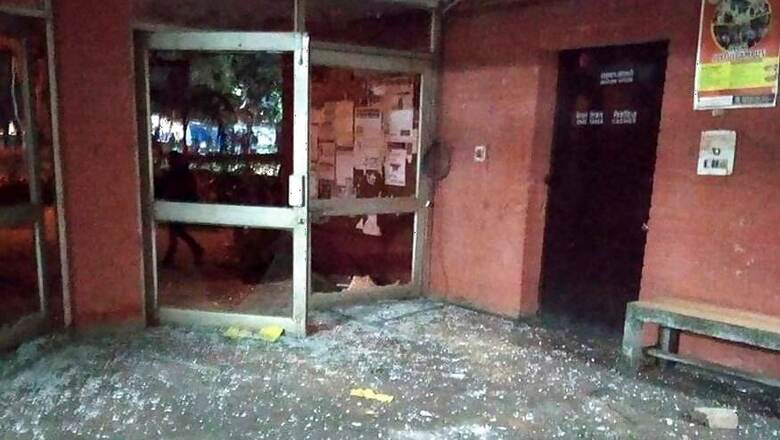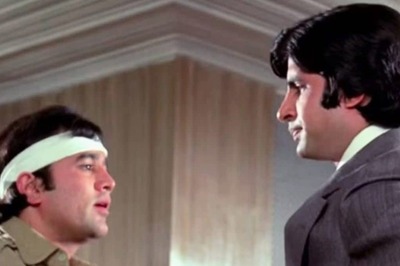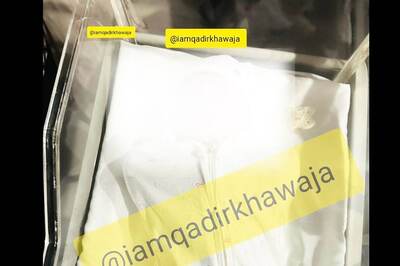
views
New Delhi: Contrary to the claims made by the Jawaharlal Nehru University (JNU) administration in an FIR, biometric systems and CCTV cameras in its server room were not vandalised on January 3, response to an Right to Information query has revealed.
An FIR filed by the university on January 5 claimed that a group of students entered the Centre for Information System (CIS) office by breaking open a glass door and “damaged the servers and made it dysfunctional and severely damaged the fiber optic cables power supplies and broke the biometric systems inside the room”.
Responding to the RTI, filed under the ‘life and liberty’ clause by an activist, the JNU administration has said the main server of the university at the CIS was shut down on January 3 and had stopped functioning the next day "due to power supply disruption".
The reply further states that “no continuous” CCTV footage is available from the cameras installed at North/Main gate of the JNU campus from 3pm to 11pm on January 5, when students and teachers were attacked with rods and sticks by a masked mob.
Another FIR filed on January 5 also accused students of vandalism which led to the malfunctioning of a number of operations, including “biometric attendance and CCTV surveillance system”.
However, in a statement issued on Wednesday afternoon, the JNU administration claimed that all FIRs and other complaints filed with police are in line with the incidents that took place on January 3.
“All FIRs and other complaints filed with police are in-line with the actual incidents that took place on January 3 and do not deviate from actual facts. The JNU administration reiterates that a group of masked students came to the CIS Data Centre premises on January 3, 2020 and forcibly evicted the technical staff, switched off the power supply, locked the premises and squatted in front of the main entrance to the CIS Data Centre without providing any access to the centre.”
It said the RTI response was given based on specific location and questions sought by the RTI applicant.
“As per the complaint filed by administration on January 3, 2020 about incident in CIS Data Centre, JNU has not claimed about the damage to servers on January 3. The RTI answers are correct and specific to the questions asked. The RTI response also clearly states that servers are located at CIS Data Centre, not in CIS office, which seems to be conspicuously ignored while highlighting the matter in the media.”
The university administration furthered claimed that before evicting the technical staff out of CIS Data Centre, the masked students forced the technical staff to shut down the systems. “This lead to the discontinuation of the winter semester registration, affecting thousands of students of the university.”
It took more than four hours to restore the entire system the next day when the technical staff got access to the centre with the help of technical staff, the JNU said in the statement.
“Damage to the CIS Data Centre server room was caused on January 4 by a group of miscreants who broke open one of the door-windows of the premises and entered the server room. Once inside, they turned off the servers and severely damaged the fire optic cables, power supplies, broke the biometric systems inside the room. The miscreants then started sloganeering and intimidated the technical staff from entering the server room,” it said.
JNU vice-chancellor M Jagadesh Kumar had alleged that the January 5 violence had its origins in the vandalism that had taken place the previous day in the server room.
Kumar had claimed that the mob had entered the campus on January 4 itself and suggested that the attack was perpetrated by Left-affiliated students. He had also claimed that broken biometric systems affected winter semester registration.
On January 5, masked people armed with rods and sticks stormed the JNU campus and assaulted students and faculty members, and vandalised property, leaving several people injured.
Several students and teachers, including JNU Students’ Union president (JNUSU) president Aishe Ghosh, were severely injured in the attack.
Leftist outfits and the RSS-affiliated Akhil Bharatiya Vidyarthi Parishad (ABVP) blamed each other for the violence.
The incident was widely criticised and protests, mostly led by student communities, were held across the country.
The Delhi Police had later released photographs of nine suspects in the case and claimed that Aishe Ghosh was one of them and led a mob that attacked the Periyar hostel on campus.
Ghosh had refuted the charges and demanded that Delhi Police make public proof of its claims. She also accused them of conducting a biased investigation.
The JNU Teachers' Association had accused the police of "underplaying" the violence on campus and termed its version "disturbing".




















Comments
0 comment